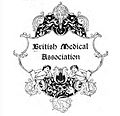British Medical Association: Difference between revisions
CSV import |
CSV import |
||
| Line 30: | Line 30: | ||
File:British_Medical_Assoc_logo_1897.jpg|British Medical Association Logo 1897 | File:British_Medical_Assoc_logo_1897.jpg|British Medical Association Logo 1897 | ||
File:BMA_House.JPG|BMA House | File:BMA_House.JPG|BMA House | ||
</gallery> | |||
<gallery> | |||
File:British_Medical_Association_logo.svg|British Medical Association logo | |||
File:British_Medical_Assoc_logo_1897.jpg|British Medical Association logo 1897 | |||
File:BMA_House.JPG|BMA House | |||
File:British_Medical_Association_Escutcheon.png|British Medical Association Escutcheon | |||
</gallery> | </gallery> | ||
Revision as of 04:32, 18 February 2025
British Medical Association
The British Medical Association (BMA) is the professional association and registered trade union for doctors in the United Kingdom. The Association does not regulate or certify doctors. This is done by the General Medical Council.
The association's headquarters are in BMA House, Tavistock Square, London. The association has national offices in Cardiff, Belfast, and Edinburgh, a European office in Brussels and a number of offices in English regions.
The BMA has a range of representative and scientific committees and is recognised by National Health Service (NHS) employers as sole contract negotiators for physicians.
The BMA's stated aim is "to promote the medical and allied sciences, and to maintain the honour and interests of the medical profession".<ref>Bartrip, Peter,
A long way from Worcester, British Medical Journal, 2007, Vol. 335(Issue: 7610), pp. 72–73, DOI: 10.1136/bmj.39269.717454.59, PMID: 17626958, PMC: 1914517,</ref>
References
<references group="" responsive="1"></references>
-
British Medical Association Logo 1897
-
BMA House
-
British Medical Association logo
-
British Medical Association logo 1897
-
BMA House
-
British Medical Association Escutcheon



